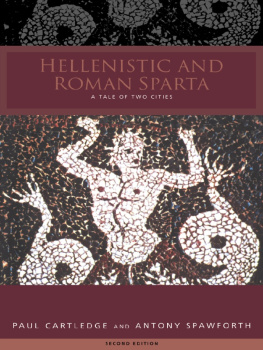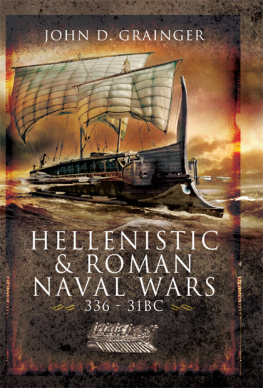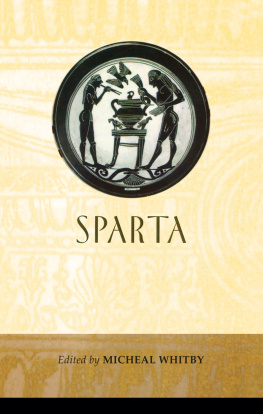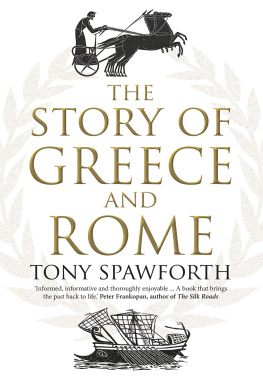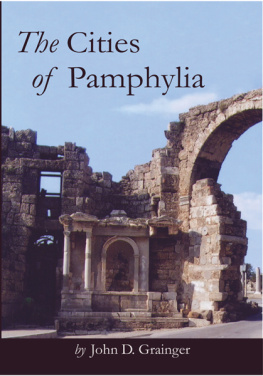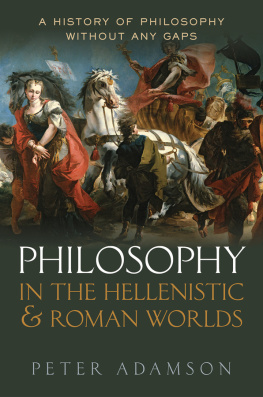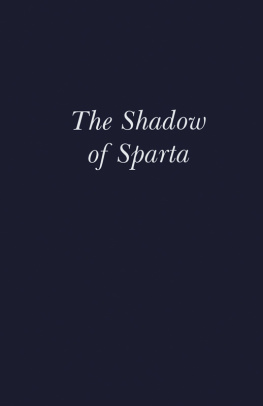Spawforth Antony - Hellenistic and Roman Sparta : a tale of two cities
Here you can read online Spawforth Antony - Hellenistic and Roman Sparta : a tale of two cities full text of the book (entire story) in english for free. Download pdf and epub, get meaning, cover and reviews about this ebook. City: London, New York, Sparta (Extinct city), Greece--Sparta (Extinct city), year: 2004, publisher: Taylor and Francis;Routledge, genre: Science. Description of the work, (preface) as well as reviews are available. Best literature library LitArk.com created for fans of good reading and offers a wide selection of genres:
Romance novel
Science fiction
Adventure
Detective
Science
History
Home and family
Prose
Art
Politics
Computer
Non-fiction
Religion
Business
Children
Humor
Choose a favorite category and find really read worthwhile books. Enjoy immersion in the world of imagination, feel the emotions of the characters or learn something new for yourself, make an fascinating discovery.
- Book:Hellenistic and Roman Sparta : a tale of two cities
- Author:
- Publisher:Taylor and Francis;Routledge
- Genre:
- Year:2004
- City:London, New York, Sparta (Extinct city), Greece--Sparta (Extinct city)
- Rating:5 / 5
- Favourites:Add to favourites
- Your mark:
- 100
- 1
- 2
- 3
- 4
- 5
Hellenistic and Roman Sparta : a tale of two cities: summary, description and annotation
We offer to read an annotation, description, summary or preface (depends on what the author of the book "Hellenistic and Roman Sparta : a tale of two cities" wrote himself). If you haven't found the necessary information about the book — write in the comments, we will try to find it.
Hellenistic and Roman Sparta : a tale of two cities — read online for free the complete book (whole text) full work
Below is the text of the book, divided by pages. System saving the place of the last page read, allows you to conveniently read the book "Hellenistic and Roman Sparta : a tale of two cities" online for free, without having to search again every time where you left off. Put a bookmark, and you can go to the page where you finished reading at any time.
Font size:
Interval:
Bookmark:

First published 1989
First published in 1992
by Routledge
11 New Fetter Lane, London EC4P 4EE
Simultaneously published in the USA and Canada
by Routledge
29 West 35th Street, New York NY 10001
Second edition first published 2002
Routledge is an imprint of the Taylor & Francis Group
This edition published in the Taylor & Francis e-Library, 2005.
To purchase your own copy of this or any of Taylor & Francis or Routledges collection of thousands of eBooks please go to www.eBookstore.tandf.co.uk.
1989, 1992, 2002Paul Cartledge and Antony Spawforth
All rights reserved. No part of this book may be reprinted or reproduced or utilized in any form or by any electronic, mechanical, or other means, now known or hereafter invented, including photocopying and recording, or in any information storage or retrieval system, without permission in writing from the publishers..
British Library Cataloguing in Publication Data
A catalogue record for this book is available from the British Library
Library of Congress Cataloging in Publication Data
A catalog record for this book has been requested
ISBN 0-203-48218-2 Master e-book ISBN
ISBN 0-203-63164-1 (Adobe eReader Format)
ISBN 0-415-26277-1 (Print Edition)
Edited by R F Willetts
Emeritus Professor of Greek, University of Birmingham
Already published
Argos and the Argolid
From the end of the Bronze Age to the Roman occupation
R A Tomlinson
The foundations of palatial Crete
A survey of Crete in the early Bronze Age
K Branigan
Sparta and Lakonia
A regional history 1300362 BC
P A Cartledge
Mycenaean Greece
J T Hooker
The Dorian Aegean
E M Craik
The Ionians and Hellenism
A study of the cultural achievement of the early Greek inhabitants ofAsia Minor
C J Emlyn-Jones
Thebes in the fifth century
Heracles resurgent
N Demand
This book is dedicated to The Ephoria of ArkadiaLakonia and The British School at Athens with affection and gratitude.
The aim of this book is to offer an account of Sparta over the eight centuries or so between her loss of great power status in the second quarter of the fourth century BC and the temporary occupation of the late antique city by the Gothic chieftain Alaric in AD 396. Books on Sparta are hardly rare. One of the chief novelties of this one is that it sets out to give full weight to the Roman phase in Spartas story, rather than making of it the usual epilogue or (at best) final chapter in a study preoccupied with the earlier periods. We thereby hope to provide a book which will interest, not only students of Sparta tout court, but also those concerned with the life of Greece and other Greek-speaking provinces under Roman rule.
Hellenistic Sparta, however, had entered the Roman Empire by no mundane route. In line with her age-old and deeply-entrenched particularism, and indeed by revivifying her esoteric traditions of political and socio-economic organization under the slogan of a return to the constitution of Lycurgus, Sparta resisted Roman incorporation right up to the last possible moment. And before Rome, Macedon and the Achaean League had been treated to a similarly defiant denial. For although old Greece (old by comparison with the post-Alexander Hellenic diaspora) as a whole was de facto subjugated by Macedon in 338 BC, Sparta persisted in ploughing an isolationist and oppositionist furrow, remaining de jure independent not just of Macedon but also of all Greek multi-state organizations (not excluding their anti-Macedonian manifestations), until she was formally and forcibly incorporated in the by then Rome-dominated Achaean League in 192 BC. This was the culmination, or nadir, of an extraordinary pentekontatia during which a succession of Spartan kings (alias tyrants to their articulate enemies) sought with surprising success to maintain the traditional freedom and self-determination of the Greek polis. This they achieved in spite or because of the most extreme measures of domestic reform, measures that some observers then and now would controversially label revolutionary, notwithstanding the ideological appeal to supposedly ancestral Lycurgan precedent and inspiration. Sparta, in short, in the Hellenistic era retains an interest, an importance and a distinctiveness that merit and demand historical enquiry no less insistently than her hitherto more illustrious Archaic and Classical predecessors.
What of the Roman period? The time now seems ripe for taking a fresh look at Roman Sparta. In the last half-century the Greek world under Roman rule has become relatively well-mapped territory, not least as a result of the stupendous scholarship of the late Louis Robert, whose meticulous studies of the post- Classical polis through its epigraphy and numismatics to a greater or lesser extent underpin all modern work on the subject, including the Roman section of this volume. The only major study of Roman Sparta to date, that of Chrimes (1949), neglected this larger perspective, adopting instead a retrospective stance and using the evidence for the Roman city merely as the starting point for a fresh examination of the evidence about the earlier period. Her approach was partly a response to that aspect of the Roman city which has most struck modern observers: its tenacious attachment to ancestral traditionor, in V. Ehrenbergs less flattering formulation, the tragi-comedy of Spartan conservatism. Part Two of the present volume offers, in effect, a reappraisal of the approach of Chrimes. It aims, firstly, to bring Roman Sparta firmly down to earth: to show that the Roman city resembled other provincial Greek communities in its political, cultural and socioeconomic organization, displaying the characteristic features of the age from emperor-worship and benefactor-politicians to colonnaded streets and hot baths. As we hope to show, some of the changes arising from Spartas enforced transition from city-state to provincial town were prefigured by the domestic reforms of Spartas Hellenistic kings, Nabis in particular; to view Sparta under Roman rule (from 146 BC onwards, that is) without reference to the immediately preceding period would be to lose an essential historical perspective.
Part Two then re-examines Spartan archaism in the Roman era, with a view to showing that this aspect of local civic life likewise had its larger context, that of the archaeomania which, with Roman encouragement, gripped the Greek-speaking provinces during the last century BC and the first three AD; in this period the recreationor inventionof the past is best viewed as a form of cultural activity in its own right. The likelihood of real continuity is diminished by this acknowledgement of the extent of Greek antiquarianism under Roman rule. On the other hand, the overshadowing of Greek culture in this period by the achievements of the past gave provincial Sparta, home of the widely admired Spartan myth, the opportunity to acquire a new international prominence, above all during the cultural flowering in the second and third centuries sometimes called the Greek renaissance. Part Two aims, finally, to document for the first time Spartas unforeseen evolution during these two centuries into a touristic, agonistic and even an intellectual centre. Although the Graeco Roman cultural outlook which permitted this development had its banal side, the development itself is of some interest. It confirms that rumours of the death of Sparta, which buzzed around the corridors of power in antiquity from the late 370s BC onwards and have been too hastily believed in more recent days, are in fact seriously exaggerated. If we stand further back, we can see it as a startling manifestation of the cultural cohesiveness which Greek civilization in its Roman summer drew from the recollection of past glories and which, in turn, contributed to the survival of a unitary Roman state in the east into the Middle Ages in the form of the Byzantine Empire.
Font size:
Interval:
Bookmark:
Similar books «Hellenistic and Roman Sparta : a tale of two cities»
Look at similar books to Hellenistic and Roman Sparta : a tale of two cities. We have selected literature similar in name and meaning in the hope of providing readers with more options to find new, interesting, not yet read works.
Discussion, reviews of the book Hellenistic and Roman Sparta : a tale of two cities and just readers' own opinions. Leave your comments, write what you think about the work, its meaning or the main characters. Specify what exactly you liked and what you didn't like, and why you think so.

